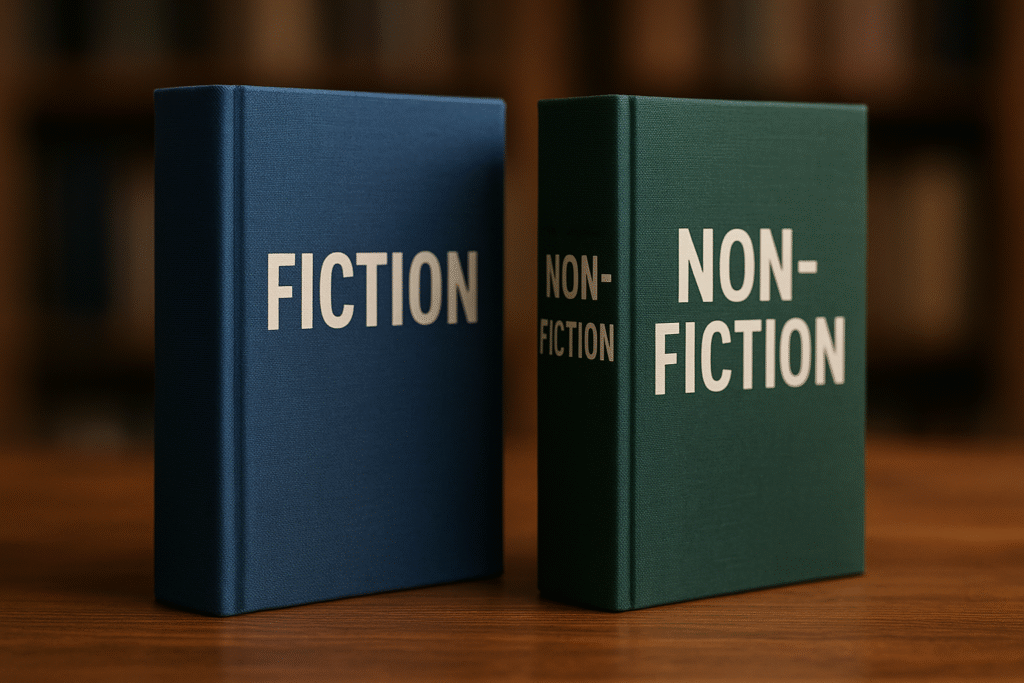Introduction: Why This Question Matters
Every new writer comes to a point of decision. Are you a fiction or non-fiction writer? And every reader knows what they want, some to disappear into fiction, others to find the practical.
Why does this question matter? Because the choice determines your writing career. It determines how you will devote your time, the audience that you will lure and even how The Book is going to sell.
Let’s unpack this, step by step with no fluff” and help you figure out which way is best for your business.
What is Fiction?
Fiction concerns people and events that are not real, even when it’s based on imaginative accounts of actual figures or episodes. It might be a romance novel or a thriller or a fantasy epic. The aim is to amuse, arouse emotion, or enable vivisection of the human imagination.
Fiction books often include:
- Novels – Novel-length stories (romance, mystery, fantasy sci-fi).
- Short Stories – Fast reads that pack a punch.
- Novellas – Between a novel and a short story.
The power of fiction is such that it can invent whole worlds or let us experience life in another person’s skin for a spell.
What is Non-Fiction?
Non-fiction refers to being factual and grounded in reality or knowledge. It’s about sharing truth. Maybe a biography, a self-help book or a business guide.
Non-fiction categories include:
Biographies and Memoirs – Anecdotes, recollections etc of one’s own life or that of another.
- Self-Help – Advice on living the best life.
- Kookaburra Business and Professional Titles – Career advice & Industry.
- History and Current Affairs – explain real events and lessons.
The most powerful attribute of non-fiction is its utility – it educates, informs or mobilises the reader into action.
The Crucial Difference between Fiction and Nonfiction
The biggest difference is purpose:
- Fiction entertains.
- Non-fiction informs.
- Both can be inspiring — but they inspire differently.
Consider it like this: reading fiction is akin to watching a movie and reading non-fiction is similar to attending a masterclass. Double life They can both shift your view, but in very different ways.
Why People Choose Fiction
Emotional Escape
Readers reach for novels when they are in the mood to escape. Good novels transport them to another place or back in time.
Relatability Through Characters
Characters in fiction generally mirror real hardships, regardless of whether the story itself is fictional. Readers connect to them emotionally.
Entertainment Value
Readers keep turning pages of a page-turner, be it a suspenseful thriller or an amusing romance. Some people are just in it for the story.
Why People Choose Non-Fiction
Practical Knowledge
Non-fiction helps readers solve problems. What Does GLOS Stand For? Whether it’s in finance, fitness or leadership, you want to apply this stuff to real life.
Inspiration From Real Lives
And memoirs and biographies offer lessons from real lives. They’re motivating because they’re true.
Professional Growth
And many nonfiction readers are reading to get ahead in their careers, or learn new skills. That need is filled by business books and industry-specific guides.
Fiction: Pros and Cons
Pros
- Creative freedom.
- Wide audience appeal.
- Strong emotional impact.
Cons
- More competitive in crowded genres.
- Success can be a matter of storytelling.
- So marketing is about fans.
- Non-Fiction: Pros and Cons
Pros
- Easier to market if expert in your field.
- Elevates your standing as an industry thought leader.
- People who buy things usually do so for a defined reason (to solve a problem).
Cons
- Requires deep knowledge or research.
- If not well-written can read a little dry.
- Niche audiences may limit reach.
Fiction vs. Non-Fiction in Publishing
- If you want to write them and send them out into the world, it matters how each one works in the marketplace.
- Fiction Romance and mystery dominate sales. Fantasy and sci-fi cater to very loyal fans. It is a tough competition, but there are best sellers and successful fiction.
- Nonfiction: Self-help, health and business are strong categories. A lot of nonfiction sells steadily, if it serves Watergate-level needs.
- The two kinds of books do well on Amazon, but the writing, editing and marketing are different.
- The Visit to the Writing Table: Fiction and Non-Fiction
Fiction Writing
- Begin with an idea for a plot or character.
- Construct a narrative of escalating anxiety.
- Consider the feelings, the pacing and immersion details.
Non-Fiction Writing
Begin with a problem to solve.
Chapter them logically (this is probably not the introduction, it’s going to be main points and a conclusion).
Examples, steps or lessons readers can take away.
The discipline required is the same — you need regularity and focus — but techniques are different.
Editing Needs for Both
- Fiction requires stronger line editing that will help in smoothing the flow and polishing dialogue.
- Non-fiction has factual checks, clarity checks and structured presentation.
- Both can profit from professional editing and proofreading services, especially if the goal is publication.
Marketing Fiction vs. Non-Fiction
Fiction Marketing
- Book trailers and teasers.
- Reader communities (BookTok, Goodreads).
- Series writing for long-term fan bases.”
Non-Fiction Marketing
- Blogging, LinkedIn articles, podcasts.
- Speaking engagements and online courses.
- Social proof and testimonials.
What Should You Write? Fiction or Non-Fiction?
Here’s how to decide:
- If storytelling, world-creation and humanity are at the top of your list then go with Fiction.
- Select Non-Fiction if you’re sharing advice, covering current events, or recounting real life experiences.
Some writers even do both. For instance, a business owner might write the non-fiction book that is essentially a guide to business and then later publish the fiction book influenced by startup life.
Why Readers Should Try Both
- Readers often side with one, but it’s a good idea to look at both together.
- It claims that fiction increases empathy, creativity and imagination.
- Non-fiction sharpens knowledge and perspective.
- Alternating both is the perfect match between fun and education.
- Olive Publishers: Supporting Authors in the Two Worlds
- Olive Publishers partners with all types of writers. For both fiction and non-fiction, you get:
- Ghostwriting assistance for those filled with ideas, but lacking the writing help.
- Manuscript proofreading to ensure quality.
- Book design for both print and digital.
- Fiction book marketing and digital marketing for book publishers to find the right reader.
- Whichever path you take, the thing to do is write well, edit judiciously and publish professionally.
Conclusion: Pick The Voice-Adjacent Path That Sounds Right For You
At the end of the day, it’s not about which kind of book is “better.” It’s about serving what’s going to fit your voice and your goals.
If you want to inspire through facts and real stories, write non-fiction. If you want to entertain and elicit emotions, there’s fiction. Both have their value.
So stop overthinking. Start writing. Your audience is out there, too — they’re probably seeking refuge from coronavirus (and who can blame them?).
FAQs: Fiction vs. Non-Fiction
Q1: What does better-fction or non-fiction?
Romance fiction is the best performer overall, but self-help and business non-fiction also do well.
Q2: Non-fiction makes it easier, not harder to write fiction?
Fiction needs originality and creativity and non-fiction calls for analysis and clarity of thought. Both have challenges.
Q3: Can my entries be fiction and non-fiction?
Yes, many authors do. Just split your audience so that you can market it effectively.
Q4: Which one is more catered to beginners?
Begin with the one you feel most comfortable making. Writing about personal expertise makes non-fiction more palatable for a lot of beginners.
Q5: How do I choose my category on Amazon?
See Amazon bestsellers, find your content match to the nearest category and pick something where you think competition is reasonable.




